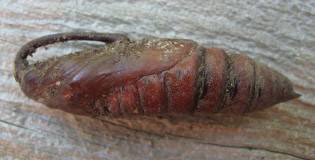
“This is the easy time,” begins Sylvia Plath’s poem Wintering, “there is nothing doing,” but this is only half the story. “The smile of the snow is white,” Plath writes, but for the dreamer of inner space, great potency accompanies the world’s obliteration in the blank whites of winter (and the more complete the obliteration the better!).
Winter is the time of nature’s dormancy, the sphinx moth’s transformation underground, the sap’s transit inward: time for putting up stores of jam and honey, “Six jars of it” perhaps, as Plath writes, “Six cat’s eyes in the wine cellar, // Wintering in a dark without window / At the heart of the house.” What a strange intensity in those watchful eyes!
There is a bleak finality to the New England winter in particular, often overstaying as it does long into what ought to be spring. Staring down the cold months ahead, one can feel as Rainer Maria Rilke wrote of the onset of the season, when “the winds run loose upon the fields,” that
He who now has no house will never have one. Whoever is alone will long remain
alone to wake, read, write long letters and wander up and down the avenues
restlessly, as the dead leaves are blowing.
But against such solitary dread, even one as melancholy as nineteenth-century French poet Charles Baudelaire could erect some warmer thoughts of winter. “Isn’t it true that a pleasant house makes winter more poetic,” runs one of Baudelaire’s prose poems, “and doesn’t winter add to the poetry of a house?” Baudelaire’s lines imply more than a simple appreciation for the comforts of the indoors. “The house derives reserves and refinements of intimacy from winter,” writes Gaston Bachelard, a great guide to the poetics of house and universe, “while in the outside world, snow covers all tracks, blurs the road, muffles every sound, conceals all colors…. The dreamer of houses knows and senses this, and because of all the diminished entity of the outside world, experiences all the qualities of intimacy with increased intensity.” Winter’s severity inspires a renewed sense of the richness of lived space within.
As the frost-swathed house draws inward, so too the dreamer.
Winter solitude —
in a world of one color
the sound of wind.
–Matsuo Basho
Basho’s wintry haiku refuses the pleasures of inhabiting yet establishes colder and stranger intimacies with the vast. The poem turns upon the convergence of two senses, sight and sound, in both cases with no “there” there. That is, at the poem’s heart stands the relationship between two kinds of nothingness – the no-color of the world gone white and the practically noiseless sound of the substanceless wind.
Basho’s poem works through a kind of paradoxical telescoping in which the intensified experience of the singular self leads directly to an intimate sense of the immense emptiness of the universe. Wallace Stevens’s poem The Snow Man takes a similar tack. “One must have a mind of winter,” Stevens writes,
To regard the frost and the boughs
Of the pine-trees crusted with snow;
And have been cold a long time
To behold the junipers shagged with ice,
The spruces rough in the distant glitter
Of the January sun; and not to think
Of any misery in the sound of the wind,
In the sound of a few leaves,
Which is the sound of the land
Full of the same wind
That is blowing in the same bare place
For the listener, who listens in the snow,
And, nothing himself, beholds
Nothing that is not there and the nothing that is.
With its own shift from sight to sound, from snow to wind, Stevens’s poem is both a more cryptic and a more elaborate exposition on the metaphysics of experience. Stevens himself, in a 1944 letter, described the poem as “an example of the necessity of identifying oneself with reality in order to understand and enjoy it.” Through a landscape devoid of human presence, the poem explores both the nature of perception and the experience of nothingness.
So winter draws at last her most reckless dreamers to herself! And beyond the threshold we too may soon awake to “look upon a world unknown,”
On nothing we could call our own.
Around the glistening wonder bent
The blue walls of the firmament,
No clouds above, no earth below, —
A universe of sky and snow!
— John Greenleaf Whitter, from Snow-Bound

